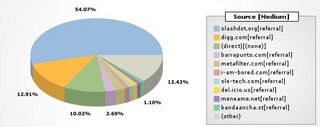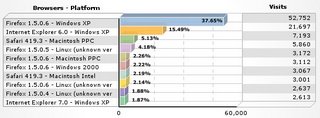An updated list of tools and links relating to Digg.
Name Comment
Digg Search Widget v2.00 A widget created by Sahas Katta of Skatter Tech for Yahoo! Widgets that allows you to quickly search and read Digg stories. [widgetgallery]
Digg Opera Widget A widget designed for the Opera web browser that allows you to view Digg's RSS feeds within the browser. [Download]
Digg.com RSS Widget A widget that gets the current front page headlines from digg and displays them in a nice little interface.
Digg Digger A widget for Yahoo! Widgets that fetches all the new stories submitted to digg.
Digg News Widget A widget for Yahoo! Widgets that receives news via various RSS feeds from Digg.com.
Diggnation Widget A widget created by Troy Hutchinson that lets you know what the latest Audio and Video Diggnation releases are.
Unofficial Digg Widget A widget, created by mikee7, that allows you to view Digg's front page headlines on your desktop.
Digg With Diggnation A widget that gives you the latest items from Digg's RSS feeds and displays the latest audio and video episodes of Diggnation.
Digg.com Toolbar A widget that gives you the latest items from Digg's RSS feeds and displays the latest audio and video episodes of Diggnation.
Digg Toolbar A toolbar that gives you access to digg's front page headlines. [Mirror]
Diggbar Toolbar A toolbar that allows easy access to some of digg's services. Compatible with Firefox and Internet Explorer.
Webpedia Toolbar A toolbar that gives you access to five different RSS feeds: del.icio.us popular, digg front page, furl most popular, hot spurls and webpedia blog.
Digg Toolbar A great-looking ticker/marquee made with Macromedia Flash. Display the feed of your choice on your website.
DiggTree DiggTree is a RSS aggregator for digg.com.
DiggDesk A RSS Reader application that displays digg's feeds in a skinnable ticker window. Very small and compact.
Clean Digg RSS Feed Digg RSS feed that links directly to story links and not Digg's comment page.
popurls.com Show popular links from Digg, del.icio.us, Furl, Flickr, Reddit, TailRank, Slashdot and Youtube.
Diggaz With Attitude Diggaz With Attitude is a program that displays the latest Digg and Google News articles in your taskbar. It also lets you add your own custom RSS feeds and get movie times based on your zip code.
Digg Top Stories Google Desktop Sidebar plug-in that displays the ten most recent stories from Digg.com. You may download directly from the authors website or from Google.
DiggTray An application that notifies you of new front page articles while sitting in your notification area.
Digg vs Dot A simple website put together to highlight the act of crossposting articles among two very popular sites, Digg.com and Slashdot.org.
DiggUpdate An application that gives you quick access to digg's front page stories in your Mac OS X menu-bar.
Digg Newstracker for Winbar Just download and rename the extension to .trk and place in newstrackers in your winbar folder.
eFinke RSS Ticker A Firefox extension that allows you to view your LiveBookmarks in a ticker form, scrolling across your browser. Add your favorite Digg RSS feeds to view them as a ticker.
whonu One of it's buttons generates it's RSS feed for many social services, including Digg.
Digg FeedFlare FeedFlare that shows your Digg counts for your blog in your RSS feed with a link to the already dugg story or a link to submit it to digg if it hasn't yet been dugg.
PocketDigg A RSS reader that formats Digg's feeds for use with a portable/mobile device.
Digg PSP A custom formatted webpage that allows you to view Digg on your PSP.
digglet PSP A custom formatted webpage, created by Lucas Steigmeyer, that allows you to view Digg on your PSP. Lucas has also created a version for other mobile devices such as cellular phones, which you can view here.
Textfairy Offers digg news for mobile devices.
Highlight Digg Comments Display a list of links to your yellow highlighted digg comments with this Greasemonkey userscript.
Digg Add Mirrors Greasemonkey script that adds mirrors to Digg's article links.
digg at Userscripts.org Digg related scripts for the Firefox Greasemonkey extension.
Digg Submit Bookmarklet v2 Digg Submit Bookmarklet allows you to quickly submit a link to Digg from your web browsers bookmarks toolbar.
gada.be/digg A site that searches digg and can generate RSS feeds for your search term.
Hot Daddy Multi-search website that allows searching of digg.com.
Digg Friends Checker Digg Friends Checker uses Google's search engine to find people who have you added to their friends list on digg. Not guaranteed to find everyone who has you as a friend, but it's pretty good.
Keotag Searches digg and other social services, generates it's RSS feed and also has a tag generator.
YubNub digg Command List YubNub is a command-line for the web. You can also install YubNub into your browser: Installing YubNub!
Talk Digger Searches conversations from many websites, including Digg. You can also have RSS feeds for your search term.
Wink People powered search engine that searches Digg.
Digg IRC An unofficial IRC channel created by a few select digg members. Great place to chat among fellow diggers.
Digg Sidebar Version 4 An unofficial IRC channel created by a few selectDigg Sidebar gives you quick navigation of digg's links via your Firefox sidebar panel. A built-in RSS Reader is included.digg members. Great place to chat among fellow diggers.
Cacheout! A Firefox extension that allows access to articles undergoing the "digg effect" using services such as CoralCDN.
Digg GMail Skin Digg GMail skin allows you to change the user-interface of GMail's webmail page to look similar to digg.com.
Digg This! A Firefox extension that adds ‘Digg this’ to the right-click context menu or Tools menu to allow you to easily submit a story to digg.
Digg Buttons Chicklet buttons that you can put on your website to link to digg.com. [Mirror]
Digg Search Plugin A plug-in for Firefox that lets you search digg for stories.
Upcomming.org Digg Group A collaborative event calendar for Digg users.
Run your own Digg Allows you to run your own Digg-type website. Choose from three different digg-clones for download.
Digg Buzz alert A page that can alert you when new stories appear on the front page of digg by use of a cheesy yet attention getting sound effect. The page must be left open in your browser to work.
Diggdot.us Have Digg, Slashdot, Del.icio.us, and Reddit all on one page.
Digg Soundboard A soundboard made from digger's comments on digg.
Direct-link versions of Digg feeds Contains Digg's entire feed list.
popTart Allows you to preview articles in a resizable frame at the bottom of the browser and also optionally remove display elements from the website such as the header, footer and sidebars. You can also use your right/left arrow buttons to page through articles.
Digg This A wordpress plug-in that detects incoming links from Digg.com to your wordpress post and automatically display a link back to the digg post, for people to digg your story. When a digg is first recognized an email is sent to the site’s admin.
Digg Userbar A custom image to use on your blog/site to show that you are a member of Digg. [Mirror]
Digg to CoralCDN A tiny standalone application that coralizes links from Digg / all in an effort to help with the "digg effect" issue.
HotDigg A screensaver (can also be run as a standalone application) that displays Digg's news article titles flying across your screen. The article titles increase in size to show popularity in a similar form as Digg's "Cloud" page.
DiggLicious A combination of digg and del.icio.us. It's definitely worth checking out.
DiggBot An automated messenger bot created to work with the popular instant messaging application, MSN Messenger. With DiggBot, you can receive the latest updates to digg's front page through your messenger. *As of April 07, 2006, DiggBot does not seem to be working anymore.
MAKEbot An instant messenger bot that can deliver the latest news, pictures, bookmarks, projects, etc. to your computer or mobile phone. MAKEbot has the ability to search digg.
read more |
digg story















